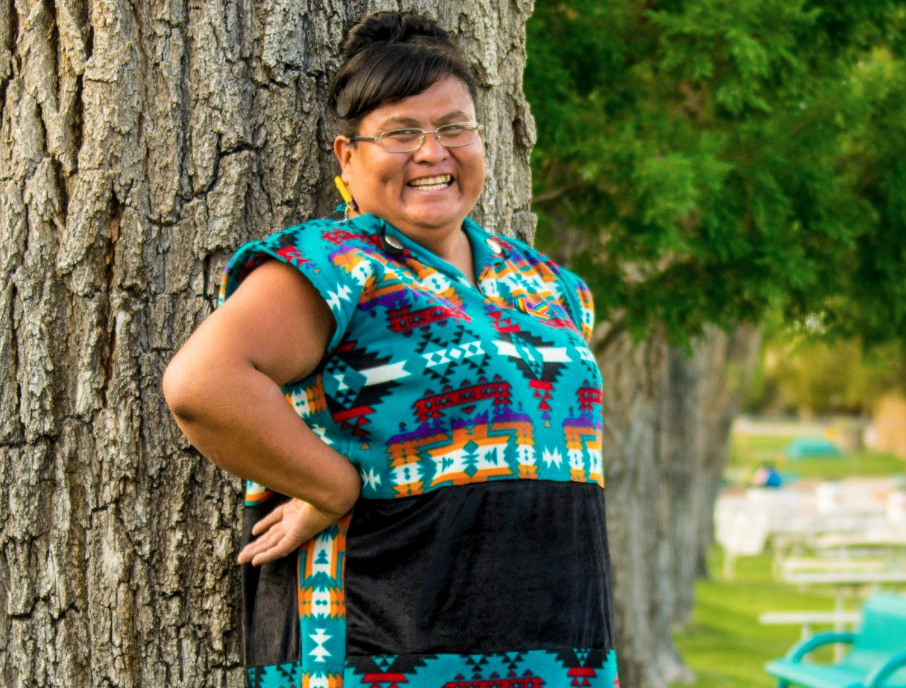The Claire Skiffington Vanguard Award recognizes community members who have been working for transgender equality for 10 years or more. For a variety of reasons and in diverse ways, these leaders have been—or are—the movement’s vanguards. Mattee Jim will be a guest of honor, speaker, and recipient of the Claire Skiffington Vanguard Award at SPARK!, our largest annual celebration. SPARK! brings together over 400 of our supporters and partners to celebrate our victories, recommit to justice, and the advancement of rights for trans and gender nonconforming people. For questions about this event, send an email to giving@transgenderlawcenter.org.
Mattee Jim is of the Zuni People Clan and born for the Towering House People Clan; this is how she identifies as a Diné (Navajo). In community spaces, she introduces herself in the Diné language first. This is one of the ways she carries forward the lineage of her people.
Mattee began her advocacy work a couple of years after she made the decision to become sober at the age of twenty-four. That marked the beginning of her volunteer work with the Navajo AIDS Network. She handed out condoms and brochures at local bars in the small, rural town of Gallup, New Mexico. She also recruited for HIV 101 house parties for an organization out of Santa Fe and conducted HIV 101 trainings at local organizations.
At this point, Mattee had yet to come into her trans identity. Mattee didn’t have terms like “trans” or “gender nonconforming” to explore. Up until her 20s, she grew up finding that she was different. She had to try and hide how feminine she was, though she didn’t know why. “I found out quickly what acceptance and non-acceptance looked like, but I didn’t know what homophobia and transphobia was,” she remembers.
She had never heard the word “transgender” until she started working with the Coalition for Equality in New Mexico. It became a safe space for her to explore her gender, and she began identifying as trans at 27 years old. Shortly afterwards, she left the coalition after feeling like she was being treated as the token voice of Native people. She was asked to talk with funders about why LGBTQ Native people are not engaged in politics. She told them the truth: “There were other things that took priority—livelihood, employment, being who we are. With our Native communities, family is a big thing, it’s part of that clan system. We were taking care of family, being there for family, being a part of ceremonies.” She was asked by colleagues: “Why did you tell them that? It may hurt our funding.” Due to high rates of homelessness, food insecurity, and unemployment, many Native LGBTQ people cannot afford to get involved in politics.
Mattee continues to have the experience of tokenization or exclusion in advocacy spaces. Native people are consistently left out of conferences, panels, decision-making processes, and leadership within many movements—among both communities of color and LGBTQ communities. When Native people are included, it’s to check off a demographic.
The Navajo Nation is one of many Indigenous nations that are victims of ongoing genocide and displacement. As Mattee put it, “We were thriving in the millions. We dwindled into the hundreds of thousands. For our population to be eradicated, because of capitalism and greed, for people to take our land and expand. People don’t understand the history of our people. It’s that mentality that we don’t matter. And it’s hurtful. And to know that all this was Native land before colonization.” When we neglect to include Native people in our advocacy spaces, we are reinforcing that very legacy of colonialism.
Speaking at the United States Conference on AIDS this year as a panelist, Mattee had told the crowd: “I have two words for everybody: intentional inclusion. A lot of Native communities, especially trans communities… at a lot of the meetings, trainings, and national tables, we’re not included whatsoever. How many of you are including Native populations in the work that you do?”
That spirit of accountability and commitment has guided her work for the last twenty years. She now leads HIV prevention programs at First Nations Community HealthSource in Albuquerque and serves as community co-chair for the New Mexico Community Planning and Action Group. Mattee’s legacy includes leadership roles with the Transgender Resource Center of New Mexico, the Circle of Harmony HIV/AIDS Wellness Conference (now in its 14th year), and the Southwest Indigenous Women’s Coalition Native LGBTQ2S Council.
Though she isn’t planning on stopping anytime soon, she is ensuring that Native trans and two-spirit youth will be able to continue the work that she’s doing by reclaiming the Diné language and cultural traditions. “I feel more respect and value for myself knowing my culture. I can now teach others.”
Recently, she participated in two ceremonies with her family coming to support her. She spoke with a healer and participated in a healing ceremony that helped with her mind, body, and soul. She was able to speak to her family fluently in Diné; this made her feel proud.
When asked what she would have told her childhood self, the child that grew up not knowing why she was different, she had the following words to share: “I would tell myself that I will be okay, that I have a bright future ahead of me. That I’ll be doing amazing work, which I didn’t realize I’d be doing. And that things are going to change, for the better. And that I’m a part of that change.”

